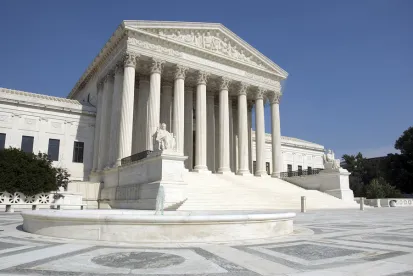Last week the Supreme Court granted certiorari to hear arguments in Kingdomware Technologies, Inc. v. United States, Docket Number 14-916, an ongoing dispute over whether the Veterans Benefits, Health Care, and Information Technology Act (“the Act”), 38 U.S.C. § 8127, requires the Department of Veterans Affairs’ (“VA”) to set aside all of its procurements for veteran-owned small businesses. The U.S. Government Accountability Office (“GAO”) sustained a Kingdomware protest after concluding that the Act does so require; the U.S. Court of Federal Claims (opinion) Court of Appeals for the Federal Circuit (opinion) both subsequently concluded that it does not.
In 2006, Congress passed the Act to increase the award of contracts to service-disabled, veteran-owned small businesses (“SDVOSB”) and veteran-owned small businesses (“VOSB”) (collectively, “VOSB”). To that end, and as is relevant here, subsection (a) of the Act directs that the Secretary of the VA shall establish annual goals for the award of contracts to VOSBs. At subsection (d), the Act directs that, “for the purpose of meeting the goals under subsection (a),” the VA “shall award contracts on the basis of competition” to a VOSB where there is a reasonable expectation that two or more such businesses will submit offers, and the award can be made at a fair and reasonable price. This type of requirement, common in small business set-asides, is called the “Rule of Two.”
The salient question to be considered by the Supreme Court is whether the ostensibly-mandatory language of subsection (d) prevents the VA from utilizing the Federal Supply Schedule (“FSS”) without first conducting a Rule of Two analysis. Generally, agencies may utilize the FSS to procure goods and services without having to conduct full and open competition, and orders against the FSS are not subject to the small business set-aside requirements of FAR Part 19, including the Rule of Two.
The issue came to a head in 2011, when the VA awarded a contract for an emergency notification system to a non-VOSB vendor it selected off the FSS without conducting a Rule of Two analysis. Kingdomware protested to GAO, arguing that the “shall award” language at subsection (d) of the Act prohibited the VA from utilizing the FSS prior to conducting a Rule of Two analysis. The VA argued that the “shall award” language at subsection (d) was limited by the language that immediately proceeded it, “for the purpose of meeting the goals under subsection (a),” and therefore the Rule of Two requirements were not applicable to all VA procurements, and so long as VA was meeting the subsection (a) VOSB-contracting goals, VA was free to utilize the FSS.
GAO agreed with Kingdomware. In sustaining the protest, it recommended the VA to set aside the procurement for VOSBs. The VA refused, maintaining its position regarding the limited applicability of the Act’s Rule of Two requirements. Kingdomware then filed suit in the Court of Federal Claims. The Court ruled in favor of the VA, concluding that the language of the Act was ambiguous as to whether the Rule of Two requirements applied to FSS procurements, and concluded therefore that the VA’s interpretation of the Act was reasonable and entitled to deference. Kingdomware then appealed to the Federal Circuit.
On appeal, the Federal Circuit also ruled in the VA’s favor, but for a different reason. It concluded that the Act was unambiguous, and that the “shall apply” language at subsection (d) was clearly linked to, and therefore limited by, the “for the purpose of meeting the goals under subsection (a)” language that immediately preceded it. The Court noted that Kingdomware’s interpretation of the Act, by which all VA procurements were subject to Rule of Two requirements, would render not only the “for the purpose of meeting the goals under subsection (a)” language meaningless, but also the subsection (a) goals themselves superfluous, because such goals would be unnecessary if every procurement was required to be a VOSB set-aside. The Court thus concluded that the VA “need not perform a VOSB Rule of Two analysis for every contract, as long as the goals set under subsection (a) are met.” (The Federal Circuit also noted in its decision the VA’s representation had far exceeded its subsection (a) goals for each year in which there was available data.)
In granting certiorari, there are a number of considerations the Supreme Court may undertake. First, whether the Act clearly speaks to the VA’s ability to utilize other contracting avenues such as the FSS without conducting a VOSB Rule of Two analysis. Second, to the extent the Court concludes that the Act is ambiguous, to what extent, if any, the VA’s interpretation of the Act is entitled to deference. Third, the Court may also consider the public interest in encouraging government contracting with VOSBs. Previous legislation encouraging contracting with VOSBs was unsuccessful, and Congress passed the Act in order to encourage more contracting with such firms. Two veterans-interests groups filed amici briefs in support of Kingdomware’s petition, and there is, of course, considerable public support for contracting with VOSBs to the broadest extent possible.
While the sides differ as to the success of Section 8127 in achieving higher veteran participation in contracting and meeting the VA’s annual goals, they agree that both the VOSB community and the VA’s procurement activity will be greatly impacted by the decision. Given the VA’s annual budget totals over $15 billion, a ruling in favor of Kingdomware would dramatically shift the VA’s procurement obligations in favor of VOSBs. And by removing the availability of the FSS in the first instance, it would also completely upend the way the VA does business.



 />i
/>i

